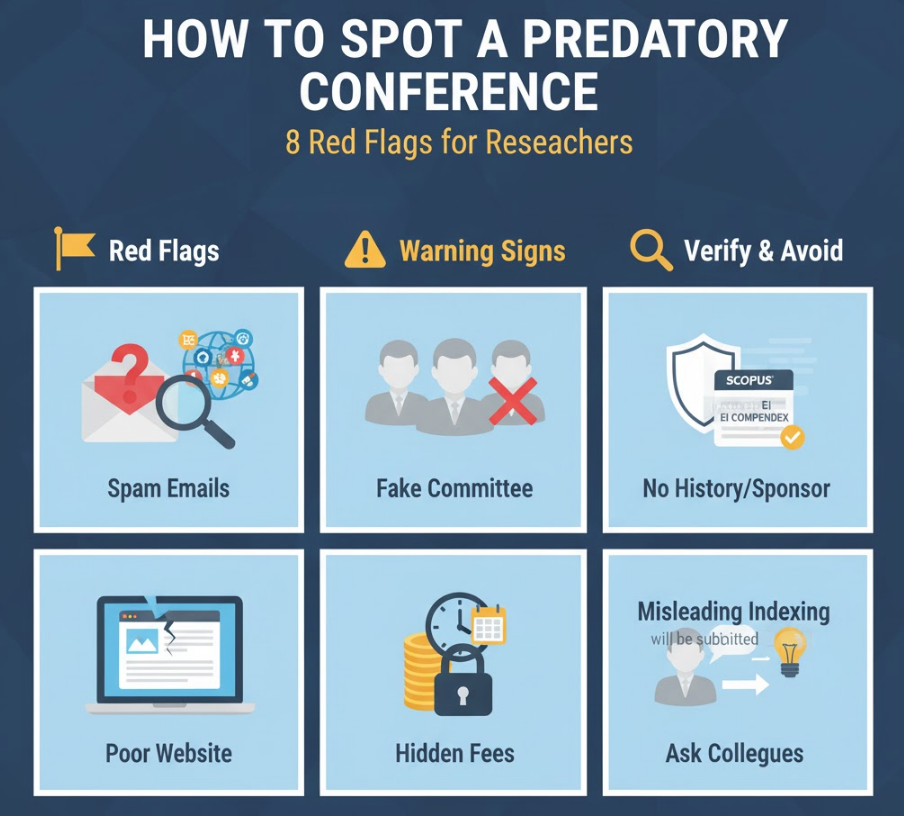

421 views||Release time: Oct 22, 2025
Academic conferences are vital for sharing research and networking. However, a growing number of predatory conferences prioritize profit over genuine scholarly exchange, often lacking rigorous peer review and providing little value. Attending or submitting to these events can waste your time, cost you money, and damage your professional reputation.
Learning to identify these predatory events is a crucial skill for every researcher. Here’s a checklist of major red flags to watch out for.

Be wary of emails that:
Arrive unexpectedly in your inbox, often with overly flattering language ("esteemed expert," "renowned contribution").
Invite you to speak or submit a paper on topics far outside your actual expertise.
Contain numerous spelling or grammatical errors.
Are not personally addressed to you (e.g., "Dear Colleague," "Dear Researcher").
Legitimate conferences focus on a specific field or sub-field. Predatory conferences often list dozens of unrelated topics to attract as many submissions (and fees) as possible.
Red Flag: A title like "International Conference on Science, Technology, Engineering, Business, and Arts."
The official conference website is often a major clue:
Poor Quality: Look for typos, grammatical errors, broken links, low-quality images, or a generally unprofessional design.
Missing Information: Legitimate conferences clearly list organizing committees, keynote speakers, venue details, and a program schedule well in advance. Predatory sites are often vague about these critical details.
Do your homework on the people listed:
Check Affiliations: Are the committee members and keynote speakers recognized experts from reputable institutions? Can you verify their involvement on their university or personal websites?
Beware of "Pay-to-Speak": Sometimes, "keynote" spots are simply given to anyone willing to pay a high fee, regardless of expertise.
Rigorous academic peer review takes time, usually weeks or months.
Major Red Flag: Any conference guaranteeing acceptance or publication within a few days or 1-2 weeks is almost certainly skipping or faking the peer-review process.
Legitimate conferences are upfront about registration costs, publication fees (if any), and what these fees cover.
Red Flag: Fees are hidden, hard to find, or only revealed after your paper is accepted.
Check Sponsorship: Is the conference sponsored or technically co-sponsored by a well-known university, research institution, or major professional society (like IEEE, ACM, Springer, Elsevier)? Verify this on the sponsor's website, not just the conference site.
Look for Past Events: Can you find evidence (websites, published proceedings) of successful, legitimate conferences held by the same organizers in previous years?
Predatory conferences often make false or vague promises about their proceedings being indexed in major databases.
Vague Language: Beware of phrases like "will be submitted to Scopus/EI Compendex" or "indexing expected." This is not a guarantee.
Verify Past Indexing: The most reliable check is to search databases like Scopus, EI Compendex (via Engineering Village), or Web of Science for proceedings from the previous editions of the same conference series. If past events weren't indexed, the current one likely won't be either.
Wasted Resources: You lose money on registration fees and potentially travel costs.
Damaged Reputation: Associating your name and research with a low-quality or fake event reflects poorly on your academic credibility.
No Real Impact: Your paper ends up in non-indexed, obscure proceedings, limiting its visibility and citation potential.
Before submitting or registering:
Ask your supervisor, colleagues, or university librarian. They are often aware of the reputable and predatory players in your field.
Check official indexing lists (Scopus Sources, EI Compendex Source List).
Trust your instincts. If something feels unprofessional or "too good to be true," it probably is.
By staying vigilant and doing your due diligence, you can ensure that you invest your valuable time and research efforts in legitimate academic events that truly advance your career and your field.